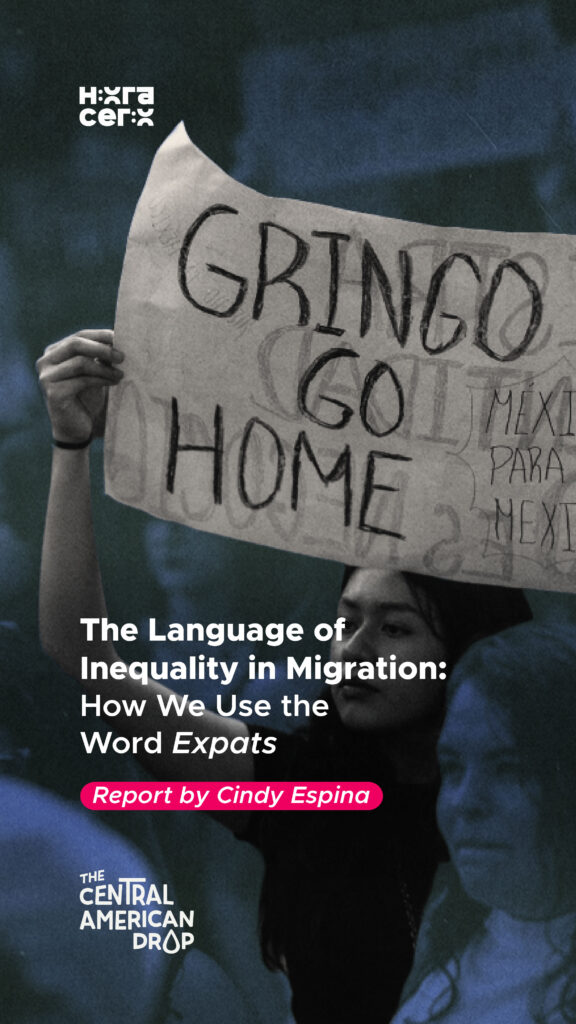
Latin American cities and small towns are facing problems of gentrification. These processes of urban change, which tend to displace the native population of affected areas and increase housing costs, have also sparked protests among city residents. Currently, the most recent and visible of such protests are the «marches against gentrification» in Mexico City, which began on July 4, 2025, and have been held three times so far, the last one on July 26 with around 200 people in attendance.
In this struggle, the word «gringo» has been a constant, prominent feature on some posters, slogans, and discussions on the topic. But, to better understand these gringos, it is necessary to name and explain «expatriate» (expat). The word expat is generally the term used by migrants and immigrants from countries like the United States and Europe to refer to themselves. They are part of the gentrification debate because these individuals are used by the housing market to justify the rising cost of rent and home sales.
In 2021, the New York Times reported on the increase in US citizens migrating to Mexico due to the introduction of remote work in some companies and restrictions in the United States due to the COVID-19 pandemic. However, this never changed; instead, it increased, and 1,182,346 Americans currently live in Mexico, according to the Association of Americans Living Abroad (AARO)

Thus, over the past three years, news headlines have portrayed expats as «the face of gentrification.» However, Colombian researcher Andrés Yánez Chavarriaga says caution must be exercised because these people are not the only ones gentrifying cities, as citizens with greater purchasing power also do the same within their own countries. However, he believes this is an opportune moment to place the word expat in context and open to public discussion.
Yánez says that being an expat is to be a type of immigrant that enjoys the capital and privileges of international mobility and immigration regulations. The term was popularized by the American writer Ernest Hemingway, who used it in his books to describe his life and artistic milieu in Paris and Cuba.
But today, the Hemingways are not necessarily Americans, and their lives are not surrounded by art and glamour. Most are digital nomads or language teachers, whose reason for «moving» is voluntary and in search of «adventure.»
But Yánez, who has researched the identity and migrations of expatriates who have worked as teachers in Colombia, asserts that the term expat is more complex. This is due to the different elements that can constitute an expatriate, such as whiteness, their country of origin, their purchasing power in the destination countries, and the social class to which they belong in their country of origin, he explains.
In this sense, an expat — not necessarily from the United States or Europe — can be originally from the global south, belonging to a middle or upper social class, and whose purchasing power or lifestyle improved as a result of their migration. Although this definition may be related to an economic situation, expats do not consider themselves «migrants» because they associate the word with forced mobility or displacement. However, this is not entirely true, Yáñez adds. The researcher found that many people migrate to countries like Mexico and Colombia because they cannot access the type of housing and consumption habits they have in their destination countries, where their salaries and currency allow them a better lifestyle.
Therefore, their migration is also linked to an economic situation. «While calling themselves expats makes a privilege visible, it also obscures the economic crisis facing countries in the global north,» in which their citizens cannot access housing and decent wages that allow them to live in line with the costs and consumption patterns of countries like the United States.
The word «gringo» on both posters and slogans about anti-gentrification has been accompanied by «get out» or «A Mexico for Mexicans.» In response to these messages, Mexican President Claudia Sheinbaum said that a demand, however legitimate such as the fight against gentrification, cannot call for the expulsion of people of other nationalities. «Mexico is a country open to the world and is not discriminatory; therefore, xenophobic attitudes cannot be justified,» the President said.
Currently, the ease of mobility, entry, and residence in Mexico is differentiated and privileged for people who call themselves expats, in contrast to the emergency faced by low-income migrants from around the world who are in transit to the United States.
Xenophobia, racism, institutional violence, and exposure to organized crime are some of the greatest concerns for these individuals. For example, in March 2023, 40 migrants from Central America and Venezuela died in a fire at the Ciudad Juárez immigration station (northern Mexico), an avoidable tragedy that came from simply not being helped out of the fire, all while deprived of their liberty not having committed any crime.
A crime that remains unpunished to this day, despite many efforts to achieve justice. The problem is that while expats enjoy various benefits due to their symbolic capital, there is another group of people whose lives are put at risk by the implementation of anti-immigration policies that prioritize control and criminalization.

| Cookie | Duración | Descripción |
|---|---|---|
| cookielawinfo-checkbox-analytics | 11 months | This cookie is set by GDPR Cookie Consent plugin. The cookie is used to store the user consent for the cookies in the category "Analytics". |
| cookielawinfo-checkbox-functional | 11 months | The cookie is set by GDPR cookie consent to record the user consent for the cookies in the category "Functional". |
| cookielawinfo-checkbox-necessary | 11 months | This cookie is set by GDPR Cookie Consent plugin. The cookies is used to store the user consent for the cookies in the category "Necessary". |
| cookielawinfo-checkbox-others | 11 months | This cookie is set by GDPR Cookie Consent plugin. The cookie is used to store the user consent for the cookies in the category "Other. |
| cookielawinfo-checkbox-performance | 11 months | This cookie is set by GDPR Cookie Consent plugin. The cookie is used to store the user consent for the cookies in the category "Performance". |
| viewed_cookie_policy | 11 months | The cookie is set by the GDPR Cookie Consent plugin and is used to store whether or not user has consented to the use of cookies. It does not store any personal data. |